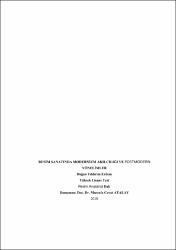| dc.contributor.author | Erdem, Doğan Yıldırım | |
| dc.date.accessioned | 2020-01-07T07:25:21Z | |
| dc.date.available | 2020-01-07T07:25:21Z | |
| dc.date.issued | 2019 | |
| dc.identifier.uri | https://hdl.handle.net/20.500.11776/3380 | |
| dc.description.abstract | Postmodernizm, modernizmin akılcı yaklaşımlarının toplumlarda yaratmış olduğu hayal kırıklıklarına karşı insanların vermiş oldukları tepki olarak ikinci dünya savaşından sonra doğmuş yaşantısal, kültürel, sanatsal durumların bir özeti olarak ele alınmaktadır. Çağın yarattığı hız unsuru içinde toplulukları modernizmin önerdiği olması gereken idealler içinde tutmanın bir imkânının kalmadığı görülmektedir. Postmodernizm olanın çeşitliliğinin bir ardalığı, insan topluluklarının irrasyonel durumlarını da içeren yaşamlarıyla bir varoluşu önermektedir. Bu durum doğal olarak modernite ve onun en belirleyici özelliği olan akıl ile de bir hesaplaşmayı beraberinde taşımaktadır. Postmodernizm eleştiri gücünü modernizmin ortaya koymuş olduğu bütün maddi manevi kültürel kalıplardan alarak tekrar ona yöneltmektedir. Bu eleştirisel bakış yer yer bir reddediş hali de alabilmektedir. Artık büyük anlatılar devri yerini yerel olan küçük anlatılar ile paylaşmak zorunda kalmıştır. Olması gerekenin değil, olanın sanata katılımı, süreci oluşturmaktadır. Postmodern düşünce; görüntü yayımının, iletişim araçlarının, ulaşım çeşitliliğinin ekonomik globalizasyonun hızı ile ilgili yaratmış olduğu sorunlara insani bir çözüm olarak önerilmektedir. | en_US |
| dc.description.abstract | Postmodernism is dealt with as a summary of the experiential, cultural, artistic circumstances which were born after the Second World War in response to the disillusionments, which the rationalist approaches of modernism created in societies. It is seen that there remains no possibility of keeping the societies within the boundaries of the ideals suggested by modernism in the speed factor the period has created. Postmodernism suggests co-existence of the diversity of the here, existence of the lives of human societies also inclusive of their irrational circumstances. This case naturally needs to settle with the modernity and also with its most important feature, the reason. Postmodernism, getting its strength of criticism from the material and moral cultural patterns produced by modernism, redirects it again to modernism. This critical point of view may take the form of rejection in places. Now, the grand narratives have had to share its field with the local and modest ones. The share of the existent in art, not the supposed, is setting the course. Postmodern thought is suggested as a humanistic solution to the problems created in connection with the speed of image broadcasting,communication instruments, transport diversity and economic globalization | en_US |
| dc.language.iso | tur | en_US |
| dc.publisher | Namık Kemal Üniversitesi | en_US |
| dc.rights | info:eu-repo/semantics/openAccess | en_US |
| dc.subject | Akılcılık | en_US |
| dc.subject | Modern | en_US |
| dc.subject | Postmodern | en_US |
| dc.subject | Sanat | en_US |
| dc.subject | Rationalism | en_US |
| dc.subject | Modern | en_US |
| dc.subject | Postmodern | en_US |
| dc.subject | Art | en_US |
| dc.title | Resim sanatında modernizm akılcığı ve postmodern | en_US |
| dc.title.alternative | Modernist Rationalism and Postmodern Tendencies in the Art Painting | en_US |
| dc.type | masterThesis | en_US |
| dc.department | Enstitüler, Sosyal Bilimler Enstitüsü, Resim Ana Bilim Dalı | en_US |
| dc.relation.publicationcategory | Tez | en_US |



















